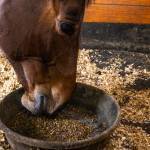Equine Digestive Health: Omeprazole and the Microbiome

Despite their power and brawn, horses have exceedingly sensitive gastrointestinal tracts. From the ease with which some develop equine gastric ulcer syndrome (EGUS) to the rapid onset of diarrhea following dietary changes or medication, owners should be vigilant and act quickly when gastrointestinal issues arise.
As an example, take omeprazole, a drug prescribed for the treatment of EGUS in many species, including horses. In humans, omeprazole administration alters the microbiome, the specialized microorganisms that populate the gastrointestinal tract and facilitate digestion.
“Studies show that alterations in the human gastrointestinal microbiome are so profound that the number of bacterial species begin to reach the low levels found in patients suffering severe bacterial diarrhea,” shared Kathleen Crandell, Ph.D., a nutritionist for Kentucky Equine Research.
Some human patients taking omeprazole also appear to have a high risk of other infectious causes of diarrhea such as salmonellosis.
Dogs treated with omeprazole also show negative changes to the gastrointestinal microbiome. In both humans and dogs, the reported changes in the microbiome occurred within one to two weeks of starting omeprazole.
“One recent study, however, found that horses do not appear as prone to changes in their gastrointestinal microbiomes as humans and dogs. This holds particularly true for the large intestinal microbiome, which was highly stable during the study period with no significant changes in richness and diversity,” Crandell said.
The gastric microbiome did change following treatment with omeprazole, with an increase in pH, which signifies a reduction in acidity. Because the changes in bacterial populations in the stomach varied between horses, no specific type of bacterium was consistently altered in treated horses.
These findings bode well for horses as EGUS occurs frequently in certain populations—up to 93% in Thoroughbred racehorses, for example. As a result, many horses receive omeprazole, either to prevent or treat EGUS, for a minimum of 28 days at a time.
“Kentucky Equine Research offers products designed to support a healthy digestive tract,” said Crandell. “Always choose nutritional products developed by reputable companies.”
*Cerri, S., B. Taminiau, A. Hache-Carré de Lusancay, L. Lecoq, H. Amory, G. Daube, and C. Cesarini. 2020. Effect of oral administration of omeprazole on the microbiota of the gastric glandular mucosa and feces of healthy horses. Journal of Veterinary Internal Medicine 34(6):2727-2737.








